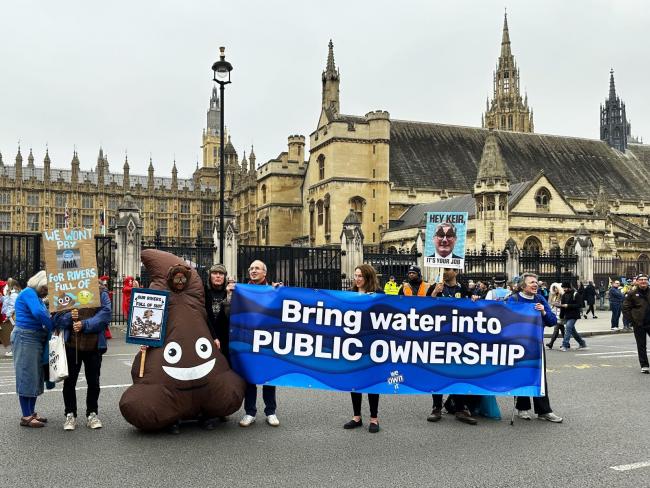19 December 2024

Bringing the message to Westminster. Demonstrators on the March for Clean Water outside the Houses of Parliament, 3 November 2024. Photo Workers.
Water bills for workers will rise by 36 per cent over the next five years, Ofwat, the regulator has announced. Ofwat will allow water companies to apply much of this increase in the first year of the five year period from 2025 to 2030. It indicated earlier this year that price rises would be far less, around 21 per cent.
Everyone uses water to drink, cook and wash, and many of us experience cuts in supply and polluted rivers and seas. It’s an essential utility, and the water companies have been performing badly for years. Unions and campaign groups have condemned the steep jump in bills.
Demands
But even these huge increases just announced are less than those demanded by the water companies. On average, the privatised water sector for England and Wales had asked for a 44 per cent increase. And Thames Water, teetering on the brink of insolvency, had demanded 53 per cent.
The water companies could appeal to the Competition and Markets Authority against Ofwat’s ruling. Thames Water is currently going through the courts for permission to raise a £3 billion loan, half of which would be conditional on an appeal to the CMA.
Quarrel
The Thames case goes to the High Court for a further hearing in February 2025. It is a complex quarrel over how to avoid temporary renationalisation between different classes of bondholders (those institutions which have advanced loans to Thames). Even though the outcome will affect them, consumers and businesses don’t get a look in, nor do Thames workers and their unions.
‘Introducing the market into water supply was the root of the problem.’
The Financial Times reported that both government ministers and Ofwat are urging Thames Water to seek a “market-led solution” to its crisis. The introduction of the market into water supply, most people would say, was the root of the problem. The companies were privatised in 1989, debt-free and with £1.5 billion of public money to support them.
Condemned
Both the GMB and Unison, the trade unions organising workers in the water industry, condemned the increases. The GMB said that the increases would not stop the leaks and sewage spills. Unite is calling for Thames to be brought back into public ownership.
Campaign groups also criticised Ofwat’s decision. For example, River Action said the regulator has “failed” and “run up the white flag”
Thames and the other companies seem undeterred by ever larger fines from Ofwat. They regard the fines as a cost of doing business, to be passed on to their customers if they are allowed.
